Hospital admissions in England for short-term and preventable complications associated with diabetes — specifically, a dangerous drop in blood sugar levels — have increased by 39 percent in the last decade, a study by researchers at the University of Leicester reported.
The study, “Trends in hospital admissions for hypoglycaemia in England: a retrospective, observational study,” was published in the journal The Lancet: Diabetes and Endocrinology.
Data for the study, conducted at the Leicester Diabetes Centre, was collected from all hospital admissions listing hypoglycemia (an abnormal drop in blood sugar) as the primary reason for admission between Jan. 1, 2005, and Dec. 31, 2014. The information was taken from the Hospital Episode Statistics database, which contains details of all admissions to English National Health Service (NHS) hospital trusts.
In total, 79,172 people were found to be admitted to a hospital 101,475 times for hypoglycemia during those years, and most of them — 72,568 (72%) — were age 60 or older. The researchers also found that 13,924 (18%) people had more than one hospital admission resulting from hypoglycemia in the study period.
The number of admissions for hypoglycaemia was seen to increase steadily between 2005 and 2010 — from 7,868 to 11,756 (a 49% increase) — then remain stable until 2014 (10,977; 39% increase from baseline). But findings showed that hospital length of stay, one-month readmissions, and incidences of mortality diminished gradually and steadily.
“Given the continuous rise of diabetes prevalence, ageing population, and costs associated with hypoglycaemia, individual and national initiatives should be implemented to reduce the burden of hospital admissions for hypos [hypoglycemics],” said Kamlesh Khunti, professor of Primary Care Diabetes & Vascular Medicine at Leicester, in a news release from the university.
Taking into account diabetes prevalence data, the researchers found that hospital admission rates declined from 4.64 to 3.86 per 1,000 person-years between 2010–11 and 2013–14. However, Professor Khunti said this was linked to an increase in people with a recent diagnosis of type 2 diabetes, who are at lower risk of hypoglycemia.
“Studies in the USA and Canada have reported increasing or stable rates of hospital admissions for hypoglycaemia,” said Dr. Francesco Zaccardi, a clinical research fellow at Leicester. “With this study we gathered information about long-term trends in hospital admission for hypoglycaemia and subsequent outcomes in England to help widen understanding for the global burden of hospitalisation for hypoglycaemia.”
The usual cost per admission for a hypoglycemic episode in England is estimated to be over £1,000 (around $ 1,300 USD). The entire cost of treating severe hypoglycemic episodes every year in the U.K. is estimated to be around £13 million.
Most hypoglycemic episodes are normally mild and can be treated by eating sweets, or drinking sweet drinks like soda or fruit juice. Hypoglycemia left untreated, however, can be serious and require hospitalization.


